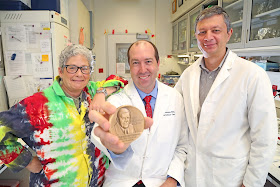The next Distinguished Scientist Seminar at the University of South Alabama College of Medicine will feature Dr. Sharon Campbell, professor of biochemistry and biophysics at the University North Carolina School of Medicine in Chapel Hill, N.C.
The lecture will take place Jan. 5, 2017, at 4 p.m. in the first floor auditorium of the Medical Sciences Building on USA's main campus.
Dr. Campbell earned her Ph.D. from Yale University in New Haven, Conn. Her work has been published extensively, and her areas of interest include GTPases and cell adhesion proteins.
The lecture series is comprised of distinguished scientists from other academic institutions who are invited by the USA College of Medicine basic science departments to present a seminar showcasing their latest research findings. Faculty, staff and students are strongly encouraged to attend.
Wednesday, January 4, 2017
Dr. Simmons Recognized by American Association for the Surgery of Trauma
The prestigious award is given to a new member of AAST who presented the best manuscript at the organization’s annual meeting.
“Dr. Simmons is an outstanding young surgeon-scientist, and he is the first person from Alabama to ever receive this prestigious award,” said Dr. Sid Brevard, professor of surgery at the USA College of Medicine and director of the division of acute care surgery and burns. “His research has brought attention to the cutting-edge work being done at USA.”
The 2016 AAST meeting was held in Waikoloa Village, Hawaii, in September. At the meeting, Dr. Simmons presented “Potential contribution of mitochondrial (mt) DNA Damage Associated Molecular Patterns (DAMPs) in transfusion products to the development of Acute Respiratory Distress Syndrome (ARDS) after multiple transfusions.”
Dr. Simmons’ presentation focused on research he completed using funds from an American Heart Association grant. His research explored the idea that extracellular mtDNA are present in transfusion products and are associated with the occurrence of a severe form of lung injury – termed Acute Respiratory Distress Syndrome (ARDS) – that occurs after massive transfusions.
“Through multiple experiments and clinical studies over the past three years, our findings support the idea that extracellular mtDNA in transfusion products significantly contributes to development of ARDS after massive transfusions,” Dr. Simmons said. “Dr. Mark Gillespie and I took knowledge learned from our basic research and applied it in a clinical context. This study resulted in a new paradigm in the understanding of complications related to blood transfusions.”
“This is one of the most interesting and significant project on which I have ever worked, and it was entirely the product of Jon’s fertile mind and keen insight,” said Dr. Gillespie, who is professor and chair of the department of pharmacology at the USA College of Medicine. “With admitted bias, I think he may have started a breakthrough in the care of the severely injured patient.”
Dr. Simmons said he is honored to receive the award, but that much of the credit should be given to our laboratory technicians – specifically Annie Muscat and Gina Capley – as well as his collaborator, Dr. Victor Pastukh, who is an instructor of pharmacology at the USA College of Medicine.
“The technical aspects of this particular project were very challenging, and it could not have been done without their expertise, guidance and hard work,” Simmons said. “This project is a shining example of what occurs at USA. Our goal is not only to treat a specific disease, but also to find a cure.”
The American Association for the Surgery of Trauma (AAST) is the most prominent trauma society in the world. The AAST established the Peter C. Canizaro Award in 1991 in recognition of his multiple contributions to the care of injured patients.


